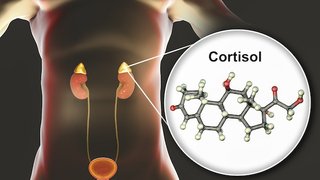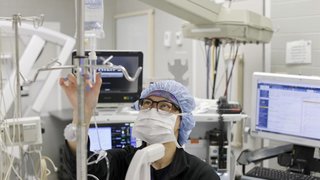Getting more sleep can help improve weight wellness
December 28, 2022

Sleep and body weight have a complicated relationship.
Chronic sleep problems can increase the risk of obesity, and obesity can disrupt healthy sleep – it’s a vicious cycle that has the potential to damage the heart and vascular system.
Research continues to quantify the connection between good sleep and weight wellness, but treating both conditions might seem like a chicken-and-egg scenario. Which do we treat first?
The short answer is that at UT Southwestern we often manage obesity and sleep disorders together. Our primary care doctors, cardiologists, neurologists, and mental health experts work closely with specialists in our Sleep and Breathing Disorders Clinic and our Weight Wellness Program.
In most cases, getting better sleep starts with diagnosing the specific disorder that keeps you up at night – whether it’s sleep apnea, insomnia, stress, or excessive snoring. Once we have that information, we can help you form healthy sleep habits and use proven weight management techniques to start you on the path toward achieving your health goals.
How we diagnose sleep disorders
Diagnosing a potential sleep disorder often starts with a conversation about your sleep habits. Technology has made it easy for almost anyone to track their sleep, so many patients show us smartphone app data that indicates they’re not sleeping well. Or they’ll tell us they don’t wake up feeling rested – or that their partner can’t sleep because of their snoring.

Depending on your health history and other symptoms, talking through your situation may provide enough detail for us to recommend a specific treatment, such as CPAP (continuous positive airway pressure) therapy. Most CPAP machines connect to a face mask and use mild air pressure to keep your airways open during sleep.
To determine the type of sleep disorder, we may recommend an in-lab or home sleep study – a series of measurements taken as you sleep. You’ll wear a few devices to track sleep-related vital signs, such as brain waves, eye movements, and oxygen levels. Some of this special equipment includes:
- A device worn around the wrist, similar to a watch, that collects data from various sensors.
- Pulse oximeter, which is placed on a fingertip to measure oxygen levels in the blood.
- Belt worn around the chest and abdomen to measure movements associated with breathing.
- Nasal cannula, which analyzes breathing patterns.
- Ring worn on the finger to record heart rate and oxygen saturation.
Home sleep studies are especially convenient at diagnosing sleep apnea from the comfort of your home. But if you have a low likelihood of sleep apnea, we may recommend an overnight sleep study at our clinic to provide more precise details and to help identify or rule out other sleep conditions, such as breathing disorders, leg movements, insomnia, or hypoxia (very low oxygen).
During a sleep study, you’ll sleep in a private room while wearing devices that collect vital data. Depending on your symptoms, we may start you on CPAP therapy during your sleep study. Seeing how you respond to CPAP gives us detailed information to help diagnose and treat your condition.
Talk with your doctor if you are concerned or unable to stay overnight. We can recommend alternative testing options, or we can connect you with caring social workers who can guide you to community resources for childcare, eldercare, or transportation.
Once we’ve diagnosed your sleep disorder, we can make a personalized plan to help you get more restful, restorative sleep.
Related reading: Sleep disorders and obesity: A vicious cycle
How we treat sleep disorders
It may be tempting to reach for an over-the-counter medication such as melatonin, ZzzQuil, or Benadryl to help with occasional sleep disturbances. But taking them with an underlying condition can put your health at risk.
For example, if you have obstructive sleep apnea and stop breathing in your sleep, your brain will try to wake you up frequently through the night. If you take a medication that keeps you drowsy, you may not wake up to resume breathing. Talk with your doctor before taking any sleep aid medications.
Many patients will benefit from making a few behavioral changes to improve sleep hygiene – the long-term habits that lead to consistently adequate sleep. Recommendations could include:

- An anchor wake-up time (waking at the same time on work days and weekends) to be able to fall asleep at a consistent time at night
- Avoid caffeinated and alcoholic drinks in the evening
- Avoid smoking cigarettes or nicotine products within 4 to 6 hours of bedtime
- Maintain a consistent sleep schedule and environment
- Avoid spending excessive time in bed while awake
- Reduce the use of devices around bedtime
- Talk with a therapist or counselor about anxiety or depression
If these steps alone aren’t enough or if you have sleep apnea, several treatments are available. Our patients have access to the most advanced sleep medicine and obesity care. UT Southwestern is one of 12 NIH Nutrition Obesity Research Centers in the U.S. – and the only one in Texas – to research the causes, prevention, and treatment options for obesity.
While multiple options are available for treatment of obstructive sleep apnea, CPAP is by far the most effective. Patients who delay starting it often admit later it was life-changing for them (and their partners). With this device, you wear a mask over your nose and/or mouth while you sleep. This attaches to a device that delivers room air with pressure so the airway stays open as you breathe.
Other treatment options include:
- BiPAP: Similar to CPAP, these devices deliver more pressure while you breathe in, and lower pressure when you exhale. Masks for BiPAP are similar to those for CPAP.
- Mandibular advancement dental device: Available from a dentist, these devices are designed to pull the lower jaw forward and keep the tongue from blocking the airway during sleep.
- Intra-oral therapy device: Devices such as eXcite OSA deliver vibratory stimuli to the tongue to stimulate and improve muscle function and prevent upper airway tissue from collapsing while you sleep. It’s worn for 20 minutes during the day, not while sleeping.
- Implanted device: Remote-controlled, surgically implanted devices such as a hypoglossal nerve stimulator (HGNS) device deliver mild electrical stimulation to the nerve that controls tongue movements, prompting the tongue to move forward and out of the airway periodically throughout the night. This can be helpful for people who can’t tolerate CPAP/BiPAP or dental devices.
If these treatments fail, we may recommend surgery if clinically indicated. Because obesity can cause or exacerbate sleep disorders, weight management plays a major role in your treatment plan.
Helping patients with weight management
We know that losing weight is challenging, and keeping weight off can be just as difficult. Your primary care doctor will help identify places where small diet and lifestyle changes could make a significant impact. We also can discuss potential barriers to weight management and strategies to overcome them.
We encourage patients to focus less on losing a specific number of pounds, which can feel intimidating, and more on achieving incremental goals that lead to a healthier, more rested you. Recommendations to improve weight wellness may include:
- Exercise: Physical activity helps with weight loss and directly contributes to better sleep. This doesn’t mean you have to immediately start running five miles a day. Instead, add bite-sized “movement snacks” or walk just a few more steps each day.
- Nutrition: What and how much you eat can interfere with sleep and weight loss. We can discuss incorporating healthy foods into your meals and connect you with a registered dietitian.
- Medication: Working closely with your primary care provider and the UT Southwestern Weight Wellness Program, a dedicated weight management program can be recommended to help with losing weight and maintaining healthy weight loss.
- Bariatric surgery: Safe and effective, bariatric surgery is proven to help patients with obesity lose weight and reduce the risk of cardiovascular problems such as Type 2 diabetes and heart disease.
Related reading: New anti-obesity drugs are closing gap between dieting and bariatric surgery
It’s not uncommon for patients to say, “I’ll try to lose some weight first, then I’ll try a CPAP.” Or they will go on the CPAP without making the changes needed to manage their weight. Because sleep and weight are so closely linked, we recommend managing both to truly improve our health.
Making changes to your sleep and eating habits can be difficult, but we are here to provide you with the resources you need. To talk with a doctor about sleep problems or weight management, call 214-645-8300 or request an appointment online.












